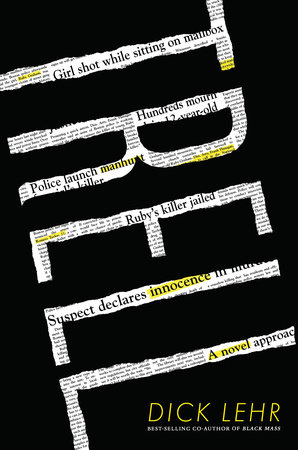Sometimes the relevance of a book to contemporary events is not linear, even if that is the author’s intent. An old-fashioned sensibility, and a commitment to the truth, layer even the most current of event topics with the upsides and downsides of a personal attachment which reaches beyond literary pragmatism. Take Trell, for example.
 Dick Lehr, a one-time Boston Globe Spotlight investigative reporter, current Boston University Journalism professor and author of many well regarded nonfiction books, has written an upper middle grade novel. If we imagine justice as an overturned cart, Trell explores the role that journalism and law can play in working to set the wheels of the cart back on the ground even when set against the competing pressures of racial politics and corruption. For a book whose primary sell in point is its immediacy to current events Trell is surprisingly, and in many senses pleasantly old fashioned.
Dick Lehr, a one-time Boston Globe Spotlight investigative reporter, current Boston University Journalism professor and author of many well regarded nonfiction books, has written an upper middle grade novel. If we imagine justice as an overturned cart, Trell explores the role that journalism and law can play in working to set the wheels of the cart back on the ground even when set against the competing pressures of racial politics and corruption. For a book whose primary sell in point is its immediacy to current events Trell is surprisingly, and in many senses pleasantly old fashioned.
The story is based upon a real-life case, the 1988 death of 12-year-old Tiffany Moore, shot by a stray bullet during an exchange of gunfire between rival gang members in Roxbury, Mass. Fourteen years later Lehr worked as a reporter to expose the wrongful arrest and conviction of Shawn Drumgold, who had been railroaded in a rush to justice complete with witness coercion by public officials and police. Drumgold had a newborn daughter who had grown to be 14 by the time Lehr took up the case.
In Trell, Lehr essentially fictionalized the case. When the book opens its version of Drumgold, Romero Taylor, has been in prison for 13 years. Van Trell Taylor, Trell to almost everyone, is Romero’s 13-year old-daughter and also the book’s narrator. The book has three heroes: Trell herself, Nora Walsh, the attorney who takes on the case at Trell’s relentless behest (based on Drumgold’s real-life lawyer Rosemary Scappicio), and Clemens Bittner, the reporter who takes on the case at Trell’s relentless behest (based on Lehr himself) .
 Proponents of #ownvoices might be underwhelmed at the idea of an older white male author writing a 13-year-old African-American girl’s first person narrative, no matter the author’s record on engagement with civil rights issues. Nonetheless Lehr does not try to expand the narrative broadly outside his experience. Race plays a very real role in the book, but the author does not attempt to depict Trell’s feelings or experiences from that vantage point. Instead we see Trell as a strong, developing young person, intelligent and resolute. The book is a coming of age but one built more on grappling with the duality of the injustice of her father’s arrest and the hard truths about his drug-dealing days, which come up during the investigation, than any sense of budding romance. Okay, there is a bit of a ham-handed attempt to check the budding romance box but it is more of a back-handed wave.
Proponents of #ownvoices might be underwhelmed at the idea of an older white male author writing a 13-year-old African-American girl’s first person narrative, no matter the author’s record on engagement with civil rights issues. Nonetheless Lehr does not try to expand the narrative broadly outside his experience. Race plays a very real role in the book, but the author does not attempt to depict Trell’s feelings or experiences from that vantage point. Instead we see Trell as a strong, developing young person, intelligent and resolute. The book is a coming of age but one built more on grappling with the duality of the injustice of her father’s arrest and the hard truths about his drug-dealing days, which come up during the investigation, than any sense of budding romance. Okay, there is a bit of a ham-handed attempt to check the budding romance box but it is more of a back-handed wave.
The secondary characters of the book — Trell’s mother, the original witnesses who testified or failed to testify, and the police officer who worked the case — are a real strength of the book. The importance of thoughtfully acknowledging change and the passage of time, and the difficulty of doing the right thing even when it is obvious what that is, are very well handled. Another strength lies in Lehr’s sticking to his roots and not trying to write a ripped-from-the-headlines story. Readers looking for a would-be despot trying to squash the freedom of the press with a social media hammer will have to content themselves with reading actual newspapers and not Trell, which isn’t trying to play the relevancy card beyond its deeply held conviction in the importance of a free press.
The weakness of the book lies in its formulaic nature. The hard-nosed lawyer whose intransigence over not taking the case wilts when faced with the iron flame of Trell’s resolve; the crusty reporter, gone to seed from his own personal drama, now a shadow of himself, living in an an unkempt apartment, rallied back into the game by Trell’s resolute pursuit of Justice which remind him of himself when he was a justice-loving youth. These are hackneyed, old-fashioned plot tropes, to be sure. Nonetheless the great strength of the book lies in its knowledge and conviction in the importance of the twin engines of the law and the press in righting wrongs. Trell is mentored by both Nora and Clemens, and looking over her shoulders readers receive an excellent understanding of how criminal defense and reporting really work.
The ending is old fashioned too, middle grade rather than YA. Trell’s hard work pays off, the people she put her trust in pulled through for her,and her father appreciates where he has been, where he is now, and Trell’s role in that. This is a story with a happy ending. Old-fashioned, maybe but as Bilbo once said, “it is a good ending, and none the worse for having been used before.”

You will not be surprised, Kenny, to learn that this sounds like just my kind of book!
While I haven’t read this book, it sounds wonderful (in spite of the reviewer’s several slams). America needs more stories about ethics, morals, and never giving up until justice is served – thank you Dick Lehr.